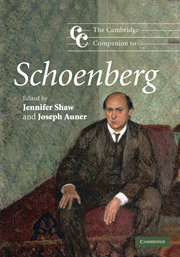Book contents
- Frontmatter
- 1 Introduction
- Part I Schoenberg's early years
- Part II Schoenberg, modernism, and modernity
- Part III Schoenberg between the World Wars
- 10 Schoenberg as teacher
- 11 Schoenberg, satire, and the Zeitoper
- 12 Schoenberg's row tables: temporality and the idea
- 13 Immanence and transcendence in Moses und Aron
- 14 Schoenberg, the Viennese-Jewish experience and its aftermath
- Part IV Schoenberg's American years
- Notes
- Select bibliography
- Index
11 - Schoenberg, satire, and the Zeitoper
from Part III - Schoenberg between the World Wars
Published online by Cambridge University Press: 28 September 2011
- Frontmatter
- 1 Introduction
- Part I Schoenberg's early years
- Part II Schoenberg, modernism, and modernity
- Part III Schoenberg between the World Wars
- 10 Schoenberg as teacher
- 11 Schoenberg, satire, and the Zeitoper
- 12 Schoenberg's row tables: temporality and the idea
- 13 Immanence and transcendence in Moses und Aron
- 14 Schoenberg, the Viennese-Jewish experience and its aftermath
- Part IV Schoenberg's American years
- Notes
- Select bibliography
- Index
Summary
The end of World War I was an especially difficult time for Schoenberg, as indeed it was for most of his compatriots. It was not only the scarcity of basic necessities such as food and coal that made for uncomfortable living. The total defeat of Austria-Hungary, the collapse of the Habsburg monarchy, the rise of new political movements inspired by the Russian Revolution in November 1917, and the creation of an Austrian Republic in November 1918 were described by the composer as “the overturning of everything one had believed in” and the beginning of a “war against all that is low and beastly.” While his introduction of radical atonality was itself commonly thought to be a violent break with tradition, Schoenberg nevertheless maintained that it was precisely a respect for tradition that ultimately justified his compositional advances. Now, however, the very idea of deferring to the past seemed in question. The third edition of his Theory of Harmony (1921) warns the reader of the dangers of using the spirit of the postwar age as an excuse for an equally iconoclastic approach to composition. “The sad part,” he wrote “is just that the idea, ‘one may write anything today,’ keeps so many young people from first learning something accepted and respectable, from first understanding the classics, from first acquiring Kultur.” It was now necessary, he believed, to distinguish between a composer (such as himself) who was a “prophet of the future,” preserving and extending an intrinsically valuable musical tradition, and the “modern” composer, who was merely concerned with being “up-to-date.”
- Type
- Chapter
- Information
- The Cambridge Companion to Schoenberg , pp. 147 - 156Publisher: Cambridge University PressPrint publication year: 2010

